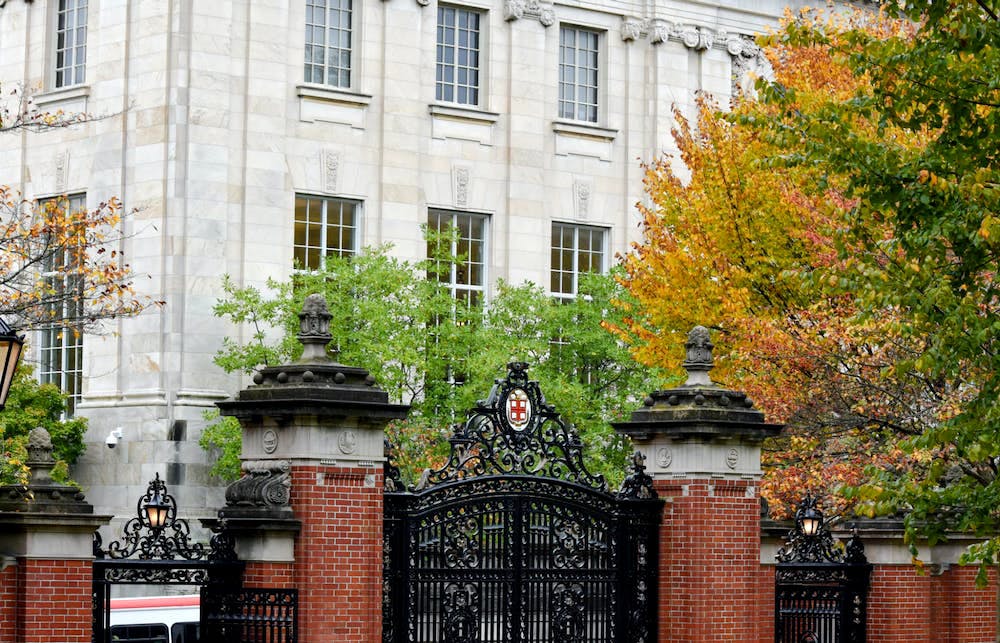During the 2022-23 Winter Session, Diyarhi Roy ’24 and the ten other students enrolled in the course EEPS 1220: “Climate Extremes and Human Rights: Winter Session in Geneva” had the opportunity to travel to Geneva, Switzerland for two weeks and listen to world leaders speak about environmental issues at U.N. conferences.
This course, co-taught by Amanda Lynch, professor of environmental studies, and Charles H. Norchi, visiting professor of international and public affairs, was one of the 14 classes offered during Brown’s Winter Session. The session ran from Dec. 22 through Jan. 24 and featured offerings ranging from online classes and on-campus research opportunities to international trips.
Through their course, Roy and her classmates were also able to visit the Office of the High Commissioner for Human Rights, the Red Cross and the World Trade Organization. Additionally, the group was invited to a “special donor conference” at the U.N. about the 2022 floods in Pakistan, where they were able to “actually sit in the room and listen while the negotiations were happening,” Lynch said.
“It was a really cool opportunity to just be in the physical space where all the work was really being done instead of just sitting in a classroom in Providence reading about it,” Roy said.
Students also had the opportunity to explore the city of Geneva in the evenings and on weekends in order to “decompress,” Lynch said. Roy noted that the bonds formed with her peers were “the best part” of the trip.
According to Roy, taking a more intensive class over a shorter period of time offered an experience different from that of a typical semester-long class.
“This is the first time we were ever really just able to focus on one class and have that be all that we were responsible for,” she said. “It just felt like there was learning at every point of the journey … whether or not we were in a classroom or … an event.”
BIOL 1980: “HIV/AIDS in Diverse Settings: Focus on Israel,” taught by Professor of Medicine Rami Kantor, also took place this Winter Session. The class brought 12 Brown students to Israel to learn about HIV and AIDS in the country through conversations with healthcare providers and HIV patients, according to Kantor.
Natalie Chernysh ’24, who hopes to become a doctor, said the trip helped her “take a step back and appreciate what medicine really is.”
“It’s not academia, it’s not organic chemistry,” she said. Instead, medicine “is about helping people, and it's making a connection with others, and it's motivating them to seek care.”
Kantor, who does not teach during the fall or spring semesters, said that he appreciates that the Winter Session allows him to devote some time solely to teaching and getting to know a group of students.
“This is a highlight of the year,” he said. “I love the personal interaction and relationships with the students as they go through this adventure with me.”
With the exception of these two international courses, most Winter Session classes took place online. But professors were able to foster close relationships with students even in an online setting, according to James Egan, professor of English.
Egan taught an introductory literary studies course over the Winter Session called ENGL 0511C: “Fantastic Places, Unhuman Humans,” which aimed to explore the question, “what does it mean to be human?”
Egan held his class in an asynchronous, online format so that students could take the course while being at home. “It seems like most students who take winter courses are also working and fulfilling other obligations,” he said. “An online course allows them to do that.”
Other online classes included ENGL 0511Q: “Romanticism Soon,” AFRI 0205: “Race and Labor: Black Workers and the Transnational Labor Movement” and AMST 1500B: “Broadway Modern: Race, Gender, Class and the American Musical.”
A research-focused class on campus called BIOL 0940G: “Antibiotic Drug Discovery: Identifying Novel Soil Microbes to Combat Antibiotic Resistance,” taught by Associate Dean of Biology Undergraduate Education Toni-Marie Achilli, had students conduct research on locally sourced soil and water samples with the aim of discovering new antibiotics.
Jayden Johnson ’24 said that the class was a perfect fit for his objectives. “I knew that I wasn’t going to be going back home (for winter break) … and I also knew that I just didn’t want to be staying here over the Winter Session and … not have anything to do,” he said. The class also contributed to his biochemistry concentration requirements, fulfilling a research credit and providing laboratory experience, he added.
According to Johnson, the class environment was more tight-knit and relaxed than a standard semester-long course. “There was definitely a pretty fun environment in the lab,” he said. “It wasn’t just everybody with their heads down, grinding on whatever it is that they’re doing.”





